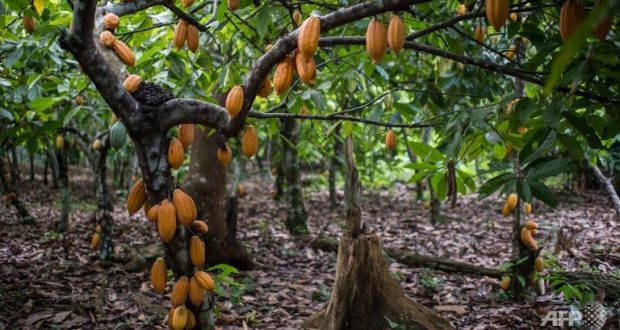New research into the living standards of cocoa farming families shows that on average, Fairtrade boosts farmers’ spending on household essentials beyond the need for food by 9%. For households living below the international poverty line of $3.20 a day[i], this figure jumps up to 14%, meaning more money in the pockets of poorer Fairtrade farmers to spend as they choose.
The 2021 study, ‘Effects of Fairtrade on farm household food security and living standards: Insights from Côte d’Ivoire’ by Isabel Knöβlsdorfer et al. from the University of Goettingen and collaborators, analyzed data from 500 randomly selected Ivorian cocoa farming households. They were evenly split between Fairtrade and non-Fairtrade certified co-operative members.
Côte d’Ivoire is the largest global producer and trader of cocoa, and despite the world’s love of chocolate, it remains a very precarious way to make a living. The results showed that cocoa is clearly the most important source of income for most of the households surveyed, accounting for 76% of total household income on average.
The study takes a novel approach, looking at what households spend money on to assess Fairtrade’s impact on living standards, not just on the household income side. According to the data, there are important difference in the way farmers spend their cocoa earnings, depending on their income level. Poorer farmers invest in meeting basic needs such as housing and clothing. Better-off households spend more on education and transport.
Thanks to higher incomes, Fairtrade certified farmers spend significantly more (18%) on non-food household essentials than those who are not Fairtrade certified. They invest in education for their children (33% more), transportation (28% more) and leisure/socializing (12% more) than their non-Fairtrade counterparts, indicating a higher quality of life[ii]. This is attributed to higher prices and yields through better access to inputs, technologies and agricultural training through Fairtrade certification.
The research also shows that the positive effects of Fairtrade certification are not influenced by farmers holding multiple other certifications such as UTZ or Rainforest Alliance.
Anne-Marie Yao, Regional Cocoa Manager at Fairtrade Africa said: “This study confirms that Fairtrade means more money in the pockets of the poorest certified cocoa farmers to spend on essentials beyond the daily need for food. Earning enough money to afford education and healthcare are things we all take for granted but are crucial to be able to live with dignity.”
Farmers in the most impoverished circumstances benefit most from Fairtrade certification, the data show. They make 69% more income from growing cocoa than their non-certified counterparts.
The study also reveals a significantly higher household level investment in education among Fairtrade farmers. This finding adds to the picture of how Fairtrade contributes to children’s education and high school attendance. For example, Fairtrade Standards prohibit child labour and provide guidance on setting up systems to monitor and remediate situations when child labour is identified, while Fairtrade Premium investments can support awareness raising on the rights of children, and paying for school fees or building renovation.
Fairtrade certification does not influence food expenditure, the study finds. The researchers associate this first with the fact that cocoa in West Africa is a seasonal cash crop with revenue for farmers coming in twice per year, and often controlled by male heads of household. Women are traditionally responsible for buying and preparing food. This may explain why most of the extra money earned from the proceeds of growing cocoa tends to be spent on non-food essentials like education, housing and socializing, typically chosen by men and are less frequent expenses. On the other hand, women’s activities such as growing other food crops for household consumption and selling some on the local market cover the households’ daily food needs. Still, where women are the head of a household and control the income, Fairtrade studies show that more money is spent on food and nutrition.
Yao continued: “This highlights why Fairtrade’s Women’s School of Leadership in Côte d’Ivoire has been so inspiring for participants, and why we are adding an emphasis on gender-inclusive household economics to our support to cocoa farmers, including through our West Africa Cocoa Programme. The research demonstrates why more needs to be done to challenge the gender gap, enabling women to have a more equal share in household decisions and succeed on their own terms.”
Better organized cooperatives are more beneficial to all farmers with and without certification, but the net effect of certification is larger in less well-off cooperatives. Fairtrade’s positive impact on yields is bigger in these cooperatives. Meanwhile, other external research based on the same data set, by Jorge Sellare et al, shows that Fairtrade leads to significantly higher cocoa yields (increases by 13% up to 21%, depending on the type of cooperative). This results in more income and an 18% higher standard of living for cocoa farmers.
[i] In addition to the $1.90-per-day international poverty line, the World Bank measures poverty lines of $3.20 and $5.50, reflecting national poverty lines in lower-middle-income and upper-middle-income countries. The report further measures poverty across a multidimensional spectrum that includes access to education and basic infrastructure. While less than a tenth of the world’s population lives on less than $1.90 a day, close to a quarter of the world’s population lives below the $3.20 line and more than 40% of the world’s population – almost 3.3 billion people – live below the $5.50 line.
[ii] Thanks to higher prices and yields through better access to inputs, technologies and agricultural training through Fairtrade certification.







